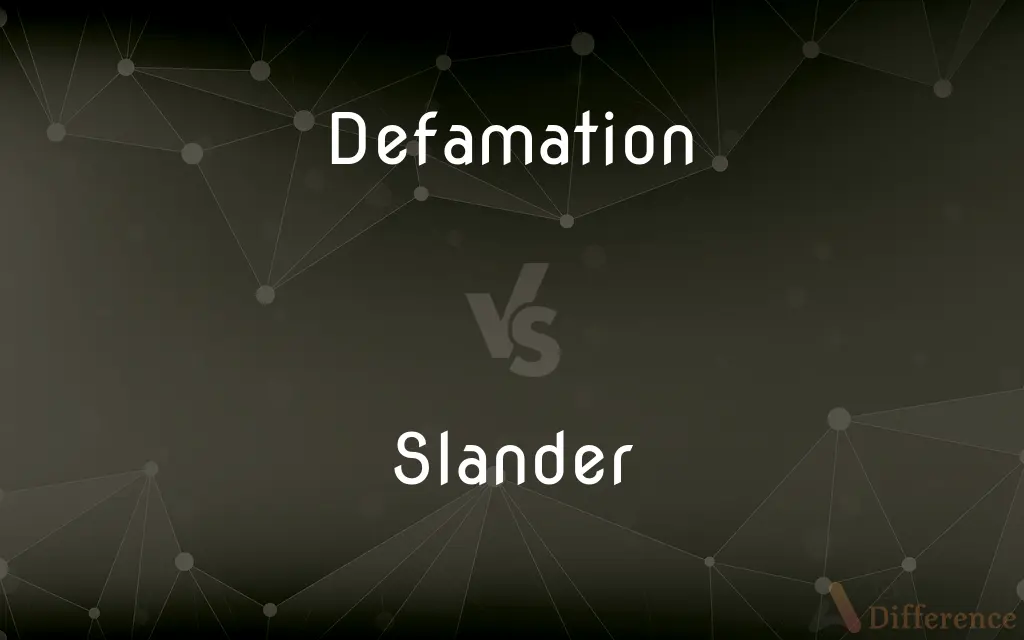Defamation vs. Slander — What's the Difference?
By Tayyaba Rehman & Fiza Rafique — Published on September 22, 2023
Defamation is a false statement damaging someone's reputation, while Slander is a specific type of defamation that is spoken, not written.

Difference Between Defamation and Slander
Table of Contents
ADVERTISEMENT
Key Differences
Defamation is a broad term that refers to any false statement made with the intent to harm another person's reputation. Slander is a subset of defamation, specifically referring to false statements that are spoken. Defamation can include written, printed, or otherwise published false statements, while slander is limited to oral falsehoods.
Defamation is a concept that can be applied in various media, including writing, pictures, or even gestures. Slander is strictly confined to spoken or oral declarations. In defamation, the focus is on the damage done to someone's reputation by false statements, regardless of the medium. In slander, the medium itself—spoken word—is part of the definition.
Defamation laws often consider the permanence of the false statement. Written or printed defamation, also known as libel, is generally considered more harmful because it has a more lasting presence. Slander, being spoken, is often deemed less permanent and may require the plaintiff to prove actual damages unless the statement falls into certain categories like accusations of criminal activity.
Defamation is generally easier to prove when it involves public figures because the standards for what constitutes harm to reputation are often more stringent. Slander, on the other hand, typically requires the victim to prove not just that the statement was false but also that it led to actual harm or loss, making it a somewhat more difficult claim to substantiate.
Comparison Chart
Medium
Various (spoken, written, etc.)
Spoken only
ADVERTISEMENT
Permanence
Can be permanent
Generally less permanent
Legal Requirements
Varies
Must often prove actual damages
Application
Broad
Subset of defamation
Examples
Libel (written), Slander (spoken)
Always spoken
Compare with Definitions
Defamation
Damage to good name through lies
Defamation lawsuits can be complex.
Slander
Spoken defamation
He was accused of slander during the meeting.
Defamation
Untrue claims damaging standing
He sued for defamation after the accusations.
Slander
Oral falsehoods damaging reputation
Slander is difficult to prove in court.
Defamation
False statement harming reputation
The article was a clear case of defamation.
Slander
Untrue spoken words affecting standing
Slander often requires evidence of harm.
Defamation
Ruining reputation dishonestly
Defamation can result in substantial fines.
Slander
Verbal lies harming character
Slander can ruin personal relationships.
Defamation
Lies causing reputational loss
Defamation is a serious ethical violation.
Slander
False spoken claims causing loss
She sued for slander after being accused falsely.
Defamation
The act of defaming; calumny, slander, or libel.
Slander
(Law) Oral communication of false and malicious statements that damage the reputation of another.
Defamation
The act of injuring another person's reputation by any slanderous communication, written or oral; the wrong of maliciously injuring the good name of another.
Slander
A false and malicious statement or report about someone.
Defamation
Act of injuring another's reputation by any slanderous communication, written or oral; the wrong of maliciously injuring the good name of another; slander; detraction; calumny; aspersion.
Slander
To utter a slander about.
Defamation
A malicious attack
Slander
To utter or spread slander.
Defamation
An abusive attack on a person's character or good name
Slander
A false or unsupported, malicious statement (spoken, not written), especially one which is injurious to a person's reputation; the making of such a statement.
Slander
(Internet) A collection of humorous videos intended to poke fun at a certain group of people, such as a community or nation
Slander
To utter a slanderous statement about; baselessly speak ill of.
Slander
(Internet) To poke fun at a certain group of people
Slander
A false tale or report maliciously uttered, tending to injure the reputation of another; the malicious utterance of defamatory reports; the dissemination of malicious tales or suggestions to the injury of another.
Whether we speak evil of a man to his face or behind his back; the former way, indeed, seems to be the most generous, but yet is a great fault, and that which we call "reviling;" the latter is more mean and base, and that which we properly call "slander", or "Backbiting."
[We] make the careful magistrateThe mark of slander.
Slander
Disgrace; reproach; dishonor; opprobrium.
Thou slander of thy mother's heavy womb.
Slander
Formerly, defamation generally, whether oral or written; in modern usage, defamation by words spoken; utterance of false, malicious, and defamatory words, tending to the damage and derogation of another; calumny. See the Note under Defamation.
Slander
To defame; to injure by maliciously uttering a false report; to tarnish or impair the reputation of by false tales maliciously told or propagated; to calumniate.
O, do not slander him, for he is kind.
Slander
To bring discredit or shame upon by one's acts.
Tax not so bad a voiceTo slander music any more than once.
Slander
Words falsely spoken that damage the reputation of another
Slander
An abusive attack on a person's character or good name
Slander
Charge falsely or with malicious intent; attack the good name and reputation of someone;
The journalists have defamed me!
The article in the paper sullied my reputation
Common Curiosities
What is Defamation?
Defamation is a false statement that harms someone's reputation.
What is Slander?
Slander is spoken defamation.
Is Defamation always written?
No, defamation can be spoken, written, or even gestural.
What has to be proven in a Defamation case?
Usually, that the statement was false and harmed reputation.
Is Slander criminal or civil?
Mostly civil, though some places might treat it as a criminal matter.
Is Slander a type of Defamation?
Yes, slander is a subset of defamation.
Is Slander always spoken?
Yes, slander is specifically spoken defamation.
Are public figures more protected against Slander?
Similar to defamation, it's usually harder for public figures to prove slander.
What are the remedies for Defamation?
Remedies can include monetary damages or retractions.
Is Defamation criminal or civil?
Generally, it's a civil matter, but some jurisdictions have criminal defamation laws.
Can companies be victims of Slander?
Yes, but they usually must prove actual harm from the spoken false statement.
What has to be proven in a Slander case?
Typically, that the spoken statement was false and caused actual harm.
What are the remedies for Slander?
Often monetary damages, but must usually prove actual harm.
Are public figures more protected against Defamation?
Generally, no. It's often harder for public figures to win defamation cases.
Can companies be victims of Defamation?
Yes, companies can sue for defamation to protect their reputation.
Share Your Discovery

Previous Comparison
Motive vs. Intention
Next Comparison
Creationism vs. EvolutionismAuthor Spotlight
Written by
Tayyaba RehmanTayyaba Rehman is a distinguished writer, currently serving as a primary contributor to askdifference.com. As a researcher in semantics and etymology, Tayyaba's passion for the complexity of languages and their distinctions has found a perfect home on the platform. Tayyaba delves into the intricacies of language, distinguishing between commonly confused words and phrases, thereby providing clarity for readers worldwide.
Co-written by
Fiza RafiqueFiza Rafique is a skilled content writer at AskDifference.com, where she meticulously refines and enhances written pieces. Drawing from her vast editorial expertise, Fiza ensures clarity, accuracy, and precision in every article. Passionate about language, she continually seeks to elevate the quality of content for readers worldwide.
















































